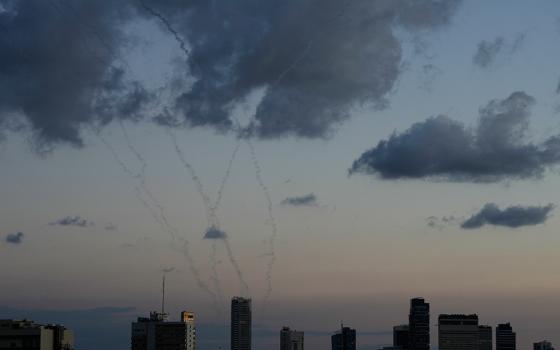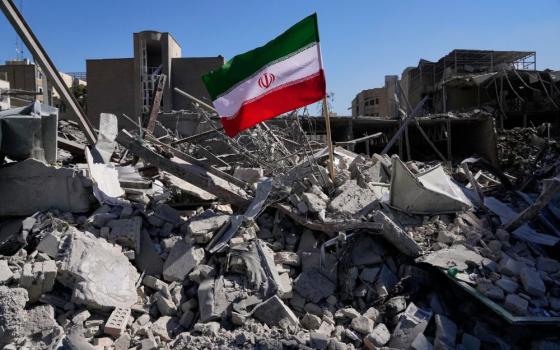
Ella Daura, 41, shares the food she received from religious sisters with her children at her home in Chibombo, a town in the central region of Zambia, on March 11. (Doreen Ajiambo)
Ella Daura, 41, with her family, recently sat on a mat in the center of their sitting room in this central region town of Zambia, quickly opened the box of food they had received from religious sisters and shared it among themselves.
"We are hungry and tired because we haven't eaten anything for the last two days," lamented the mother of three, who also lives with a dozen of her relatives. "Today, we are eating, and I thank God and the sisters who are donating food to us to save us from starvation."
Daura and her family are among millions in the southern African country currently facing starvation due to a prolonged drought that has resulted in significant crop losses and poor harvests in the last farming season.
"Hunger is a terrible thing because you feel like you will die. So when I go to bed hungry with my children, I cry a lot because I feel like I am failing my children," she said.

Srs. Christine Mubanga (left) and Matilda Mubanga, both members of the Daughters of the Redeemer congregation, on their way to donate food boxes to the villages in Chibombo, a town in the central region of Zambia on March 11. (Doreen Ajiambo)
Over 50% of Zambia's 19 million people depend on agriculture for food, primarily through smallholder production, according to Africa Development Bank Group. Oxfam, a global organization that fights inequality to end poverty and injustice, reports that over six million people from farming families are facing high levels of food insecurity until the next planting season, which is one year away. The report adds that El Niño and climate change have caused drought in this landlocked country.
The severe drought prompted President Hakainde Hichilema on Feb. 29 to declare a national disaster and emergency, allowing for more resources to address the crisis. "The destruction caused by the prolonged drought spell is immense," he said in a national address from Lusaka, the country's capital. Hichilema said the drought had hit 84 of the country's 116 districts, affecting more than a million farming households.
Religious sisters have joined the government, international donors, and people of goodwill in providing lifesaving food assistance to drought victims. Sr. Matilda Mubanga of the Daughters of the Redeemer said her congregation started to donate food and other essential materials in January to residents of Chibombo and other areas.
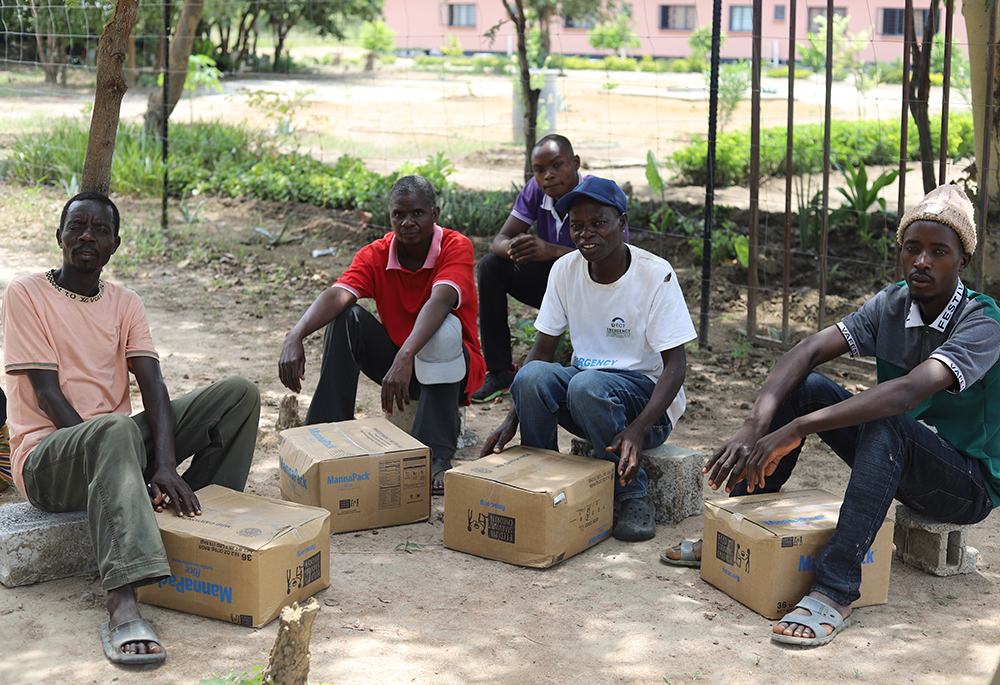
Residents of Chibombo sit under the trees after receiving food boxes from religious sisters on March 11. (Doreen Ajiambo)
"We have been targeting extremely poor households and asking well-wishers in the church to help us reach out to more people," said Mubanga, the project coordinator of her congregation. "We have concentrated in Chibombo because many people there are poor and starving. Residents of Chibombo depend on farming for sustainability; therefore, it is troublesome if it doesn't rain. People could even die, and children get kwashiorkor or even marasmus, which are diseases caused by food deficiency."
Mubanga said her congregation distributes food items such as rice, beans, lentils and cooking oil to more than 200 poor households monthly. "There are some things we consider when referring to an extremely poor family, like lack of an animal, no source of employment, or lack of any family member who might be working," she said.
Sr. Christine Mubanga, who helps Matilda distribute food to hunger-stricken families, said their congregation had also started an ambitious school feeding program in Chibombo and other areas to keep thousands of children in school. The sister said the congregation was providing porridge to children in school, most of whom had dropped out due to lack of food.
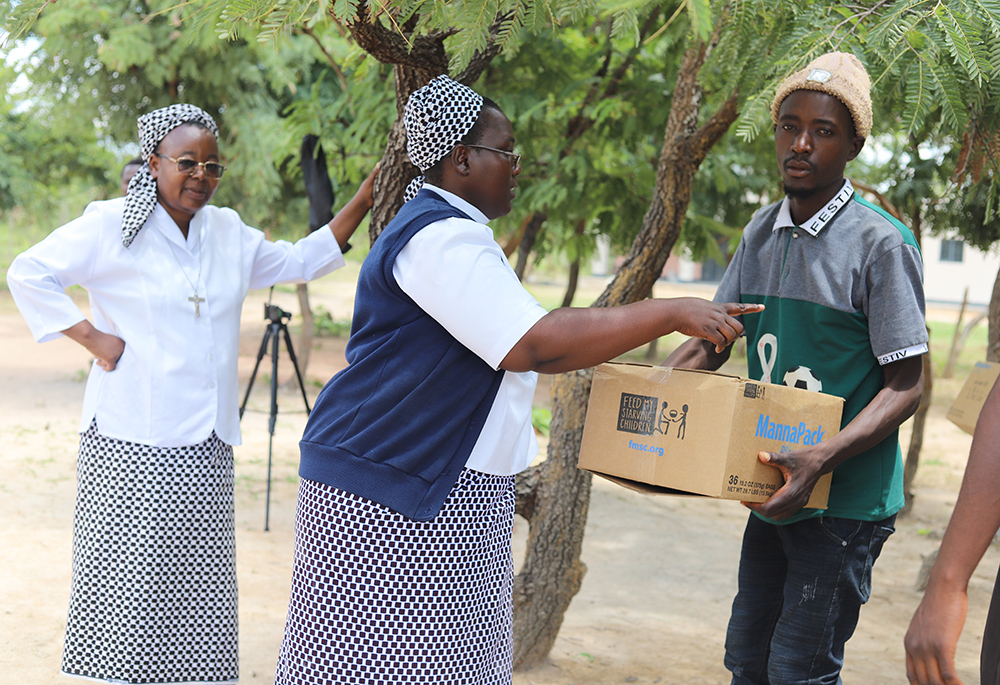
Sr. Christine Mubanga donates a food box to a Chibombo resident in the central region of Zambia on March 11. (Doreen Ajiambo)
"The number of children attending school has gone up, and the number of children suffering from malnutrition has gone down because of the nutritious porridge we supply in school," the sister said, urging more well-wishers to join in and support children to remain in school. "This feeding program cannot be sustained due to lack of funds, and we appeal for more support to ensure that children continue with their education."
The country's leaders, church leaders and residents have lamented the devastating impacts of climate change. They urged industrialized nations that have become wealthy by a carbon-intensive development path to finance vulnerable countries' adaptation to the effects of climate change.
Advertisement
According to the CDP Africa Report, Zambia and other African countries are responsible for the smallest share of global greenhouse gas emissions at 3.8%, in contrast to 23% in China, 19% in the U.S., and 13% in the European Union. Yet, Africa faces some of the most severe challenges due to climate change.
"We are suffering as a nation because of the things we least contributed to," grieved Daura, noting that climate change has pushed millions of people into poverty. "We are sleeping hungry because of climate change. Our crops have failed again this season, and we have no food in our houses because of climate change. Our children are suffering from stunting and malnutrition, and they don't go to school because of the effects of climate change."
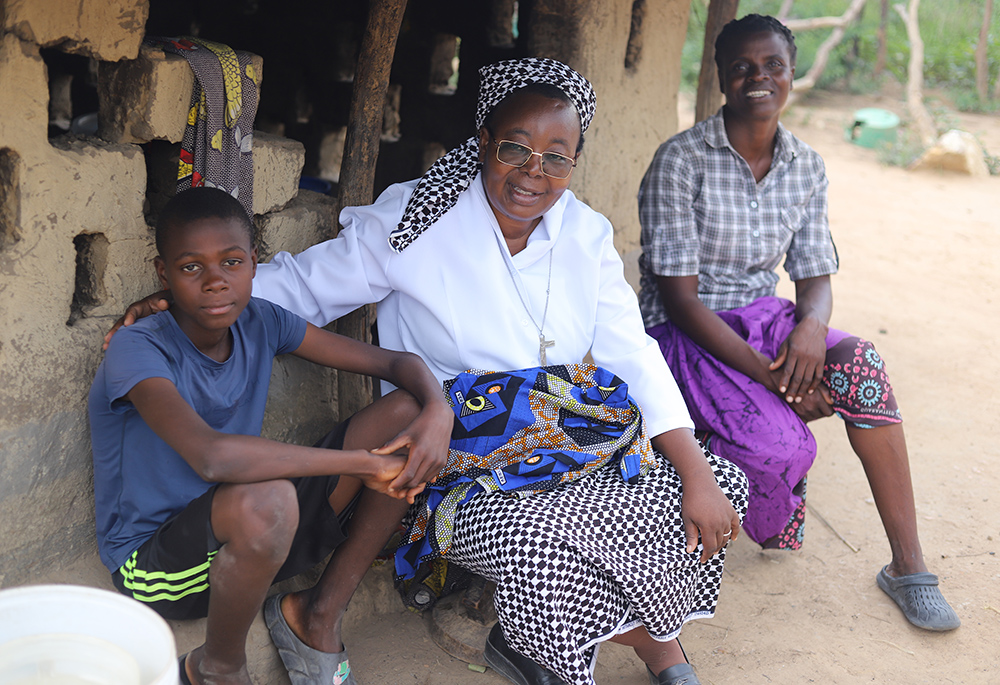
Sr. Matilda Mubanga visits Ella Daura at her home in Chibombo, a town in the central region of Zambia, on March 11. (Doreen Ajiambo)
During last year's United Nations COP28 climate summit in Dubai, countries agreed on a loss and damage fund to help developing countries cope with the effects of climate change. Several countries, including Germany, Japan, the United Arab Emirates and the United States, announced contributions to the fund during the convening.
"Many people in African countries are facing the severe effects of climate change, and that is why we are asking those who are responsible for this to pay by giving the loss and damage funds, especially the countries in the Global North," Collins Nzovu, Zambia's minister of green economy and environment, told Global Sisters Report in an interview in Lusaka.
"The United States and other European countries need to come in so that they can help our people by giving us the funds to curtail the severe weather patterns that are affecting our people."
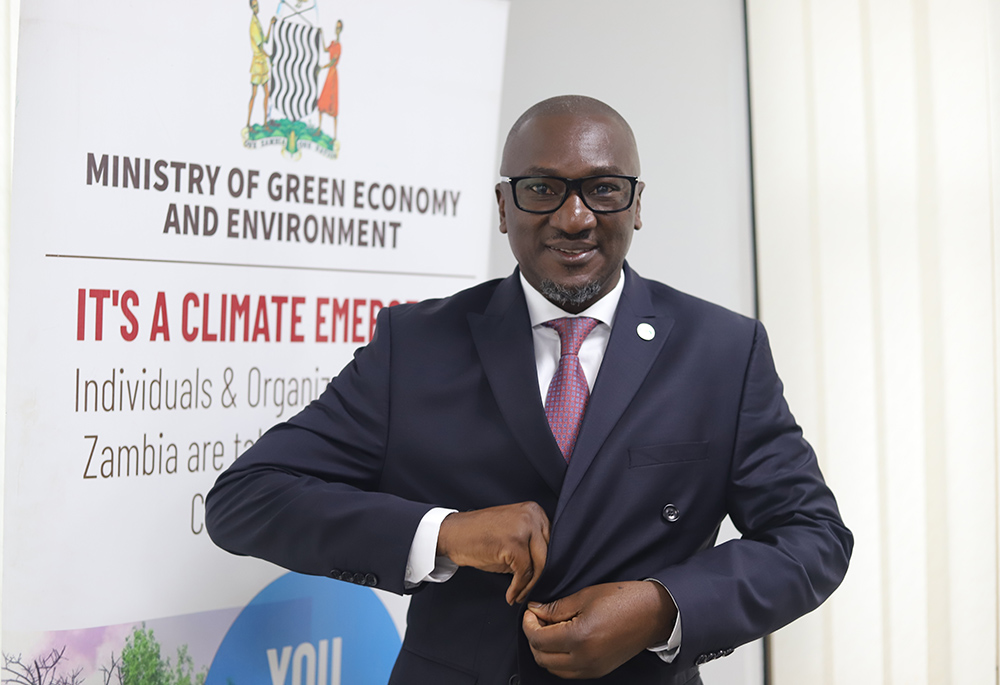
Collins Nzovu, Zambia’s minister of green economy and environment (Doreen Ajiambo)
Sr. Matilda Mubanga agreed with the minister's call, saying countries in the Global North had no option but to pay up. "Many people in this country are farmers who depend on corn as a staple food and also for sale. So, with erratic weather patterns, farming is becoming difficult," she said.
Meanwhile, sisters are mitigating the unpredictable weather conditions by teaching farmers how to plant drought-resistant crops like cassava, millet and sorghum.
"We also teach them about kitchen gardens or planting vegetables in sacks around their house and using minimal water from their dishes to water the vegetables," said Sr. Christine Mubanga. "As a long-term plan, we've decided to install boreholes in various villages to help supply water needs to the entire community."





